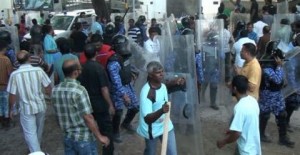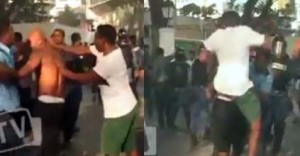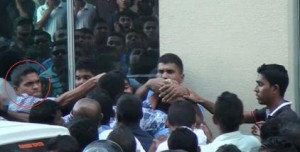Police have denied arresting or investigating any police officers who provided information to the former ruling Maldivian Democratic Party (MDP) for use in its recently released report, entitled “Military and Police coup”.
The report claims to cite primary sources, including police officers, who reported the “unlawful and criminal activity” of mutinying police officers in the events leading up to former President Mohamed Nasheed’s resignation on February 7 afternoon, in what the party alleges was a opposition-backed military coup. The report named those oficers it alleged were the key conspirators.
“We have not arrested anyone or any officers regarding the MDP’s report,” Sub-Inspector Hassan Haneef told Minivan News, following reports that a police officer was arrested this morning.
He added, “I am not aware of any such investigation. But we have numerous ongoing internal investigation relating to several officers.”
Nasheed’s party has however claimed police are on a “witch-hunt” against key police witnesses who provided crucial information to the investigative report, co-authored by former Environment Minister Mohamed Aslam and National Security Advisor Ameen Faisal (also former Defence Minister).
According to the MDP’s Facebook page Yellow Force, an officer identified as Staff Sergeant Ahmed Naseer was arrested this morning on suspicion of aiding MDP’s investigation.
Pictures circulating over social media show Sergeant Naseer being taken to a police vehicle by two plain-clothed police officers.
Meanwhile, a copy of a court warrant dated June 13 was posted on the same page indicating that police are investigating another officer, Mohamed Hameed, for “violating police duty” and “abusing authority to provide information to help specific people gain political benefit”.

He is suspected of “assisting the compilation” of MDP’s report, which the police alleged “is misleading and has tarnished public confidence in the institution.”
According to the warrant, an email containing MDP’s draft report with amendments was sent to Hameed’s gmail account, and further messages were found suggesting that he had discussions about the report prior to its release.
Asked about the warrant and the apparent arrest, Sub-Inspector Haneef repeated that no one was arrested: “That’s all we can confirm at the moment,” he said.
Sub-Inspector Haneef however stopped short from denouncing the authenticity of the court warrant.
Evidence of police brutality on February 7

As violence escalated in capital Male’ on the early morning of February 7, the country witnessed police and military officers siding with opposition protesters who had been calling for Nasheed’s resignation and release of Criminal court Judge Abudulla Mohamed – who was at the time detained by the military on the grounds that he was a threat to national security.
MDP’s report alleges that military intelligence had learned of Nasheed’s opponents consipiracy to topple his three-year old government by soliciting “about 500 police officers to protest at the Republic Square” and had also gathered backing from high rank military officers.
Identity of some of the leading rogue officers were revealed in the report- prompting the government to call denounce the report as an act of terrorism, alleging that the information had endangered lives of those officers and their families.
The report recounts the confrontations and provides evidence of police brutality against MDP members, with authorities arming opposition protesters with police shields, gas masks and pepper-spray canisters. It highlights recording showing police protesting in the Republican Square and attacking the Maldives National Defence Force (MNDF) Headquarters, while President Nasheed was still inside.
Pictures included in the MDP report show former Deputy Minister for Home Affairs Hassan Mahir being kicked in the back and forced to the ground during the unrest while surrounded by police and protesters.
Senior MDP member Ahmed Shahid (husband of MDP MP Eva Abdulla) was pictured being similarly kicked by a man identified as Corporal Mohamed Niyaz (now promoted to Sergeant). His shirt was ripped off and he was beaten up by police.
Meanwhile, Chief Superintendent Mohamed Jinah, head of police drug unit, was pictured handcuffed on a launch. He was reported to have been beaten up by rogue police officers before being taken to Dhoonidhoo Detention Centre along with several other senior officers.

A picture showing an attack on Superintendent of Police Ibrahim Manik was also included. He was struck on the head using an extendable steel baton, by a man identified as Corporal Waseem from Police Special Operations (SO).
However, to date no action has been taken against any of the officers, while both police and MNDF have refused to comment on the subject until the CNI concludes its investigation.
Neither have any independent institutions including the Human Rights Commission, Prosecutor General Office, Police Integrity Commission announced of an investigation into the criminal activities of the police during the events of February 7.
They all say, “a coup investigation is not within our mandate.”


